Home » Articles posted by farah.am.q (Page 16)
Author Archives: farah.am.q
Recent Posts
- CSE faculty receives research funding from Google
- CSE SDP Contest Day Fall 2025
- QU Students Win First Place at the AIX Summit Hackathon!
- CSE Faculty Secures QRDI Grant Award for AI-Integrated Islamically-Grounded Psychotherapy
- CSE Dept. Honored at Huawei’s “Innovation in Education and Talent Excellence” Event
Archives
- December 2025
- November 2025
- September 2025
- August 2025
- May 2025
- February 2025
- January 2025
- December 2024
- November 2024
- September 2024
- June 2024
- May 2024
- April 2024
- March 2024
- February 2024
- January 2024
- December 2023
- November 2023
- October 2023
- September 2023
- June 2023
- May 2023
- April 2023
- March 2023
- February 2023
- January 2023
- December 2022
- November 2022
- October 2022
- September 2022
- August 2022
- May 2022
- April 2022
- March 2022
- February 2022
- January 2022
- December 2021
- November 2021
- October 2021
- September 2021
- August 2021
- July 2021
- May 2021
- April 2021
- March 2021
- February 2021
- January 2021
- December 2020
- November 2020
- October 2020
- September 2020
- August 2020
Categories
CSE Students Participate in Huawei’s “Seeds for the Future” Program
September 6, 2022 / Leave a comment
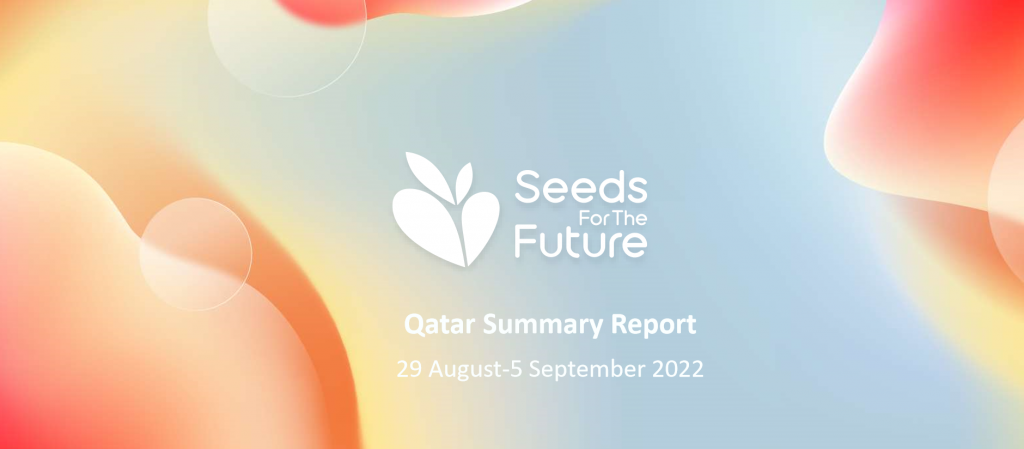
Under the endorsement of Qatar Communication Regulatory Authority and Ministry of Communications and Information Technology, Huawei Technologies organized its “Seeds for the Future” program over 8-day online training from 29 August to 5 September 2022. The program targeted Qatar elite university students to obtain valuable cutting-edge ICT knowledge developed by Huawei and promote creativity amongst students by acting as a bridge between the classroom and the industry enhancing students’ future opportunities. The program offered a rich experience involving technology courses including 5G, cloud computing, AI, IoT, leadership course, and participation in “Tech4Good” group project.
This year, 24 students from QU, HBKU, UDST, and CCQ have participated in the Huawei SFTF program. We are proud that QU-CSE students Sara Metwaly and Rufus John Kurian got awarded QU Best Performance and Daily Proactive Student awards respectively.
Big congratulations to our wining students and wishing them the bright future in their study and beyond!
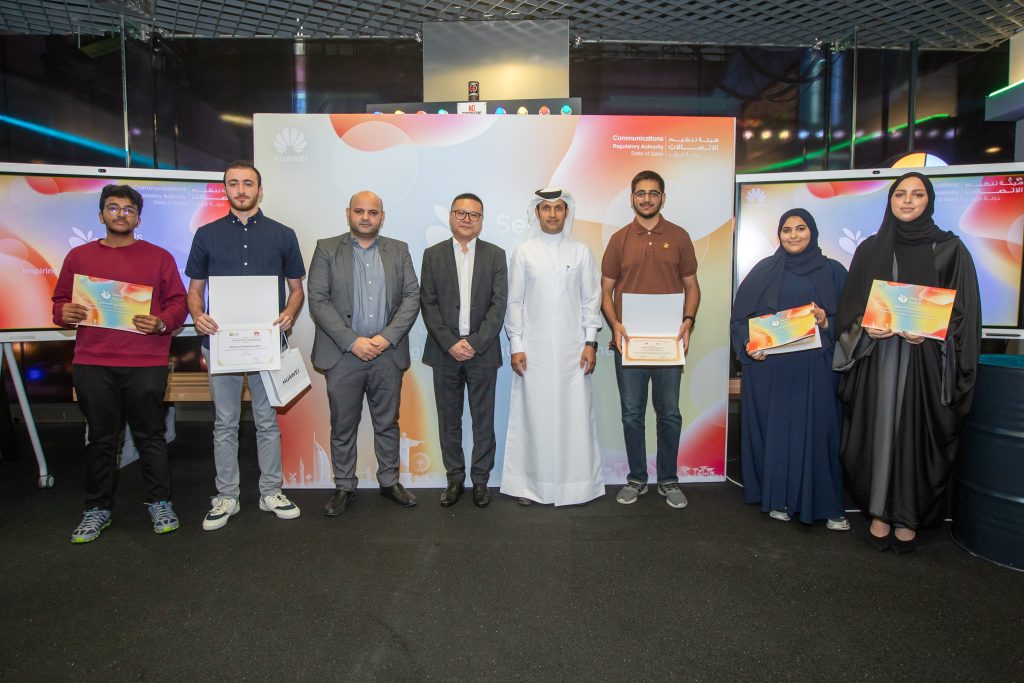
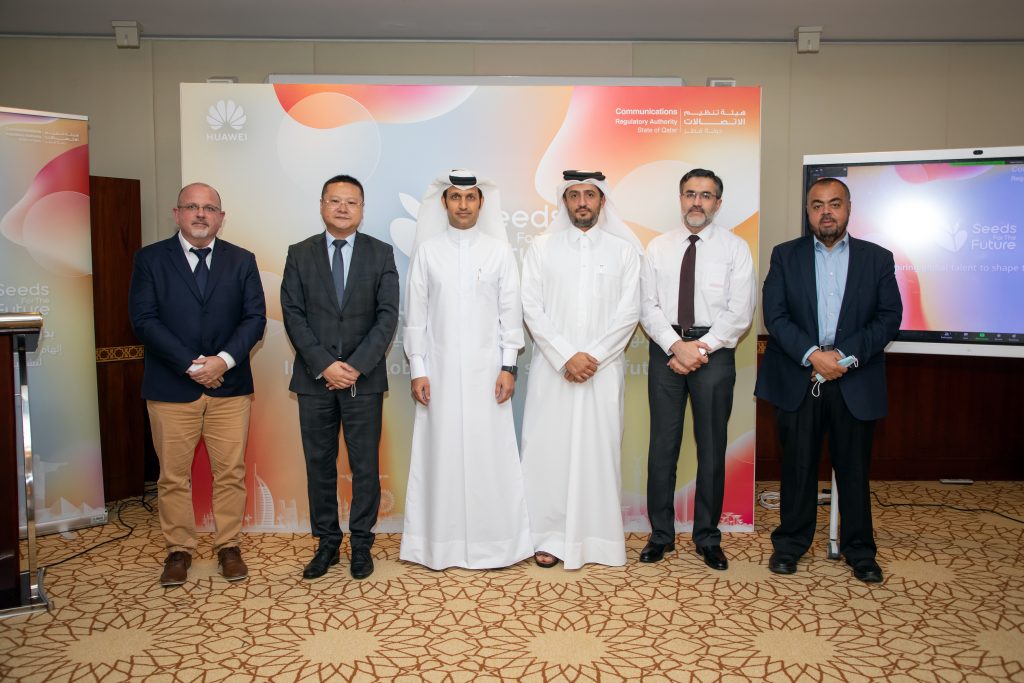
Welcoming Our New Faculty for Fall 2022
September 4, 2022 / Leave a comment
The Computer Science and Engineering Department happily welcome 8 new members this fall. Here is a small biography about each of the new members.
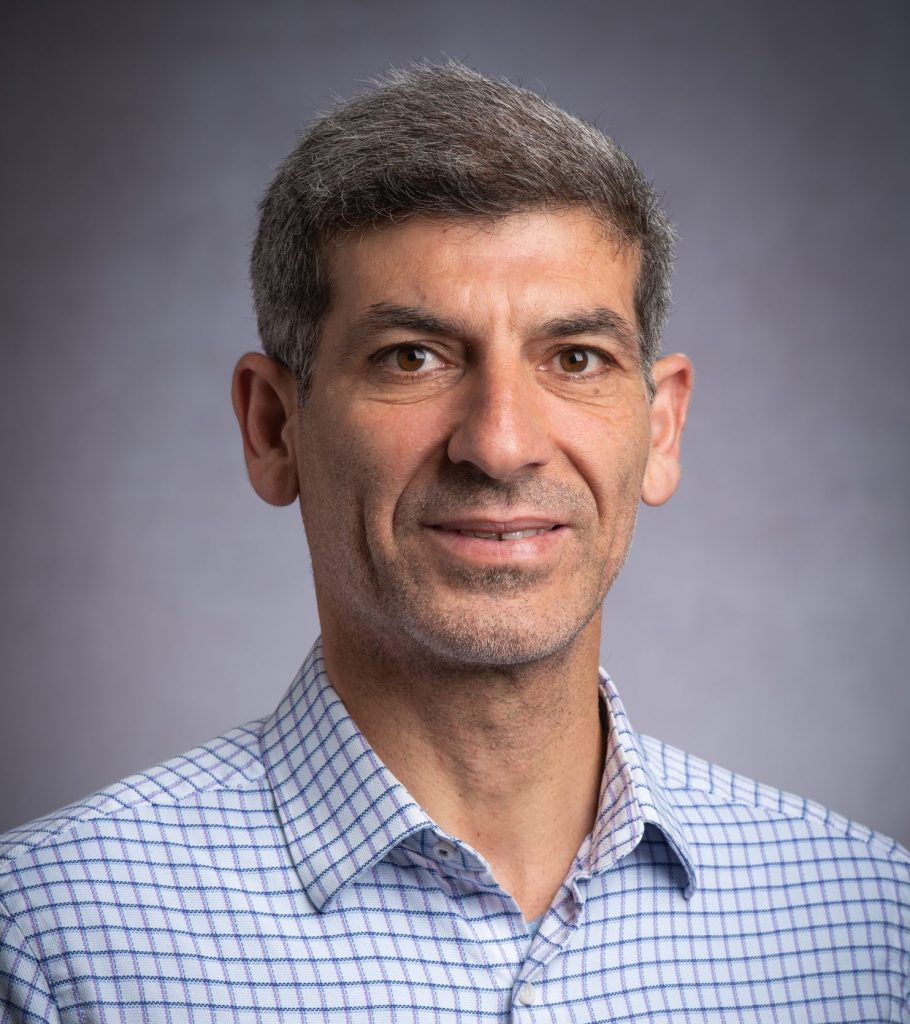
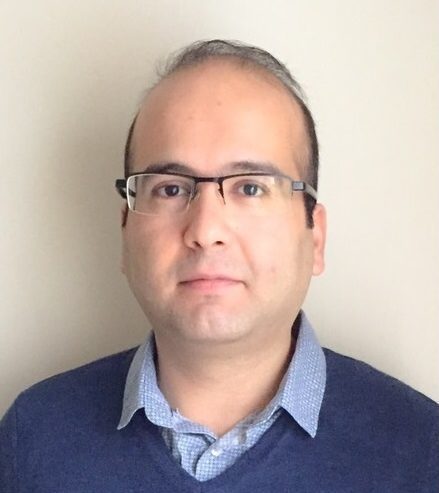

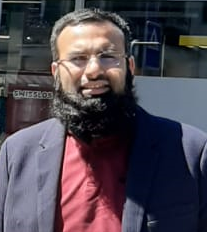
Prof. Saeed Salem is currently a full professor at our department. He received his Ph.D. in computer science from Rensselaer Polytechnic Institute, New York. From 2009 to 2022, he was an assistant, associate and then full professor at North Dakota State University, Fargo, ND, USA. Dr. Salem’s research is in the broad areas of graph mining, network learning, and machine learning with a focus on developing algorithms for mining frequent and significant graphs for cybersecurity and bioinformatics. Dr. Salem’s group developed enumeration algorithms for mining all frequent subgraphs, cross-graph dense graphs, and approximate frequent subgraphs from heterogeneous graphs.
Dr. Mahmoud Barhamgi is a currently an associate professor at our department. He received his Ph.D. and HDR (Accreditation to Direct Research) in Computer Science from Claude Bernard Lyon-1 University in 2010 and 2020. He worked as Associate Professor in the Computer Science department of Lyon-1 University between 2011 and 2022, and was member of the French National Research Centre (CNRS). His current research work is focused on engineering solutions that would make the digital space safer for people and more respectful of their rights such as the right to privacy, transparency and fairness.
Dr. Mohammed Al-Sada is an assistant professor at our department. He earned his B.S and Msc in computer science from Qatar University and Waseda University, respectively. He earned his Doctoral of Engineering Degree in computer science and communications engineering through the leading graduate program of embodiment informatics, Waseda University, Tokyo, Japan. His research interests are mainly in design, development and evaluation of novel wearablerobotic systems and x-reality systems.
Dr. M. Moazam Azeem is currently working as an assistant professor at our department. He worked as Assistant Professor at King Faisal University, KSA in 2021. He was a Research Associate at the School of Computing and Digital Technology, Birmingham City University, UK in 2020. He also has been working as System Architect at Continental Automotive at the department of Wireless Communication from 2018-2020 in France. Mr Moazam received his industrial PhD degree in Radiocommunications from France-Telecom in collaboration with CNAM Paris in 2014. His main research interests lie in Cognitive Radios, Spectrum Sensing, Opportunistic Spectrum Access, Erasure Correcting codes, Multiple FPGS Boards, IoT, Smart Cities and V2X Communication.
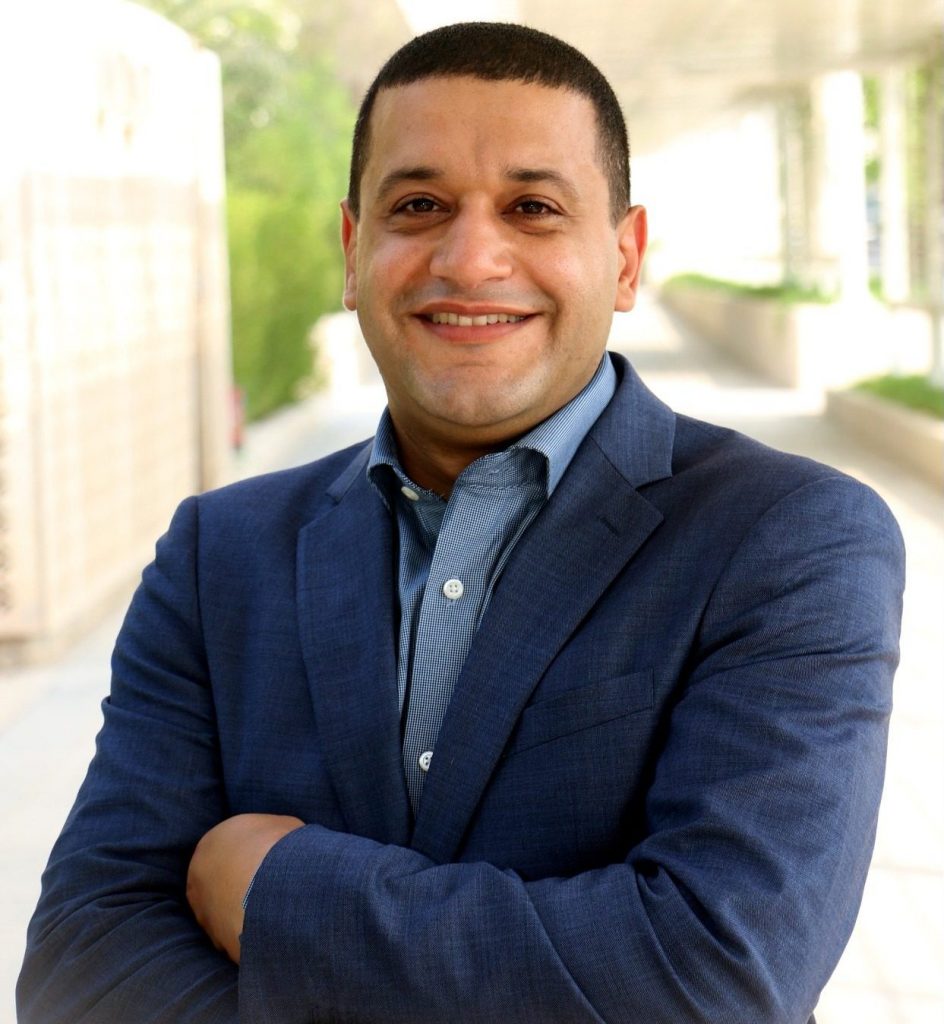
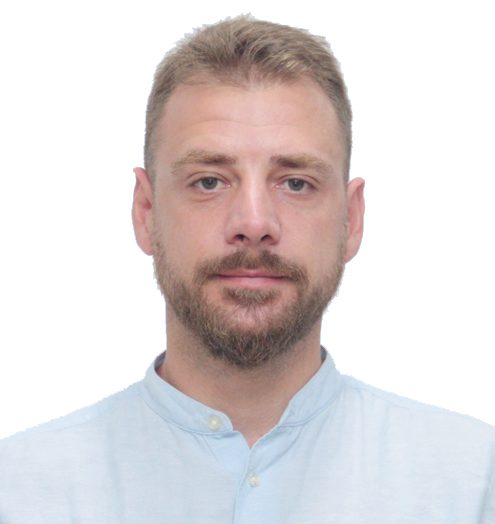
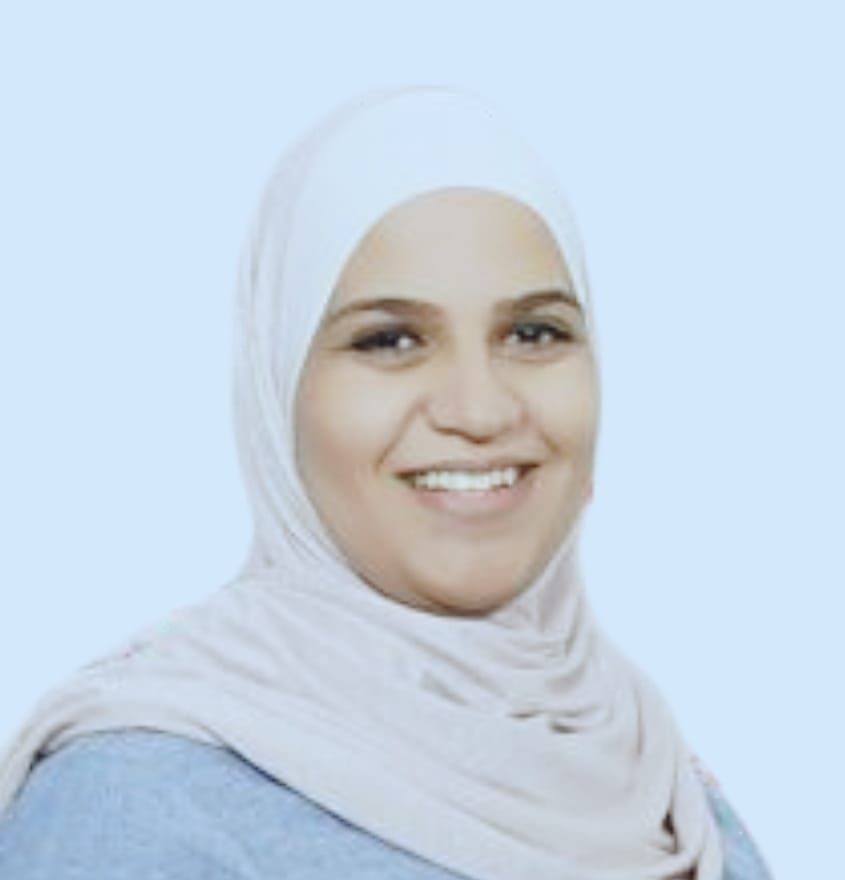

Dr. Ahmed Badway is currently an assistant professor at our department. He received the PhD from Politecnico di Torino, Italy in 2017. Soon after finishing his PhD, he joined Ericsson, Canada as a Radio Algorithm designer, where he got to work on state-of-the-art algorithm design for 5G radios. He also worked as a Systems Engineer for Riots Micro, now acquired by STMicroelectonics. His research interests include wireless communication and networking, physical layer security, smart antenna systems, biomedical signal processing and hardware implementation of communication systems. Dr. Badawy has more than 25 publications in top tier journal and conference venues and has three granted US patents and another 4 filed patent applications. Dr. Badawy is currently serving as an Associate Editor of IEEE Networking Letters and IEEE Open Journal of the Communication Society.
Dr. Jurlind Budurushi is currently a lecturer at our department – Cyber Security Concentration. He is currently teaching Applied Cryptography, and Operating Systems. He is an active researcher in Cyber Security, Cloud Security, Usable Security and Secure, Verifiable Electronic Voting Systems. He has published more than 25+ peer-reviewed papers in interdisciplinary journals and conferences, and has served in many security journals and conferences as organizer, editor, program committee, and reviewer. Before joining QU he has gained extensive experience in industry by working for 5+ years in different projects while holding different roles as Security Consultant, Security Subject Matter Expert, Security Engineer, and Chief Cyber Security Officer. Previous to his industrial experience, as a postdoctoral researcher, he has been leading the research field of “Security and Privacy Delegation”
Eng. Amal Almasri is currently a teaching assistant of Computer Engineering at our department. She received her Master of Science in Computer engineering from the German Jordanian University, Amman, Jordan in 2018, and her bachelor’s degree in Computer & Communication Engineering from Al-Zytoonah University of Jordan with honors in 2013. Eng. Almasri has an experience in higher education that started 9 years ago. She taught many courses for undergraduate students in Jordan and the United Emirates and participated as a research assistant in a project funded by NATO at German Jordanian University. She has a promising publication record in the field of Wireless Sensor Network’s power optimization and routing protocols in prestigious journals.
Eng. Leila Gastli is a teaching assistant of Computer engineering at our department. In 2018, she graduated from Qatar University with BSc. in Electrical Engineering along with a High Distinction Award. During her studies, she was the secretary then the vice chair of QU IEEE Student Branch. In 2020, she received her master’s degree from the Swiss Federal Institute of Technology in Zurich (ETH), in Biomedical engineering. She was a graduate student researcher at the Computer Vision Lab there then the MR Technology and Methods Lab. Her research interests include medical imaging, computer vision and signal processing.
Invitation to attend a seminar: An overview to evolutionary algorithms and randomization-based ML algorithms
August 24, 2022 / Leave a comment
Don’t miss the seminar!
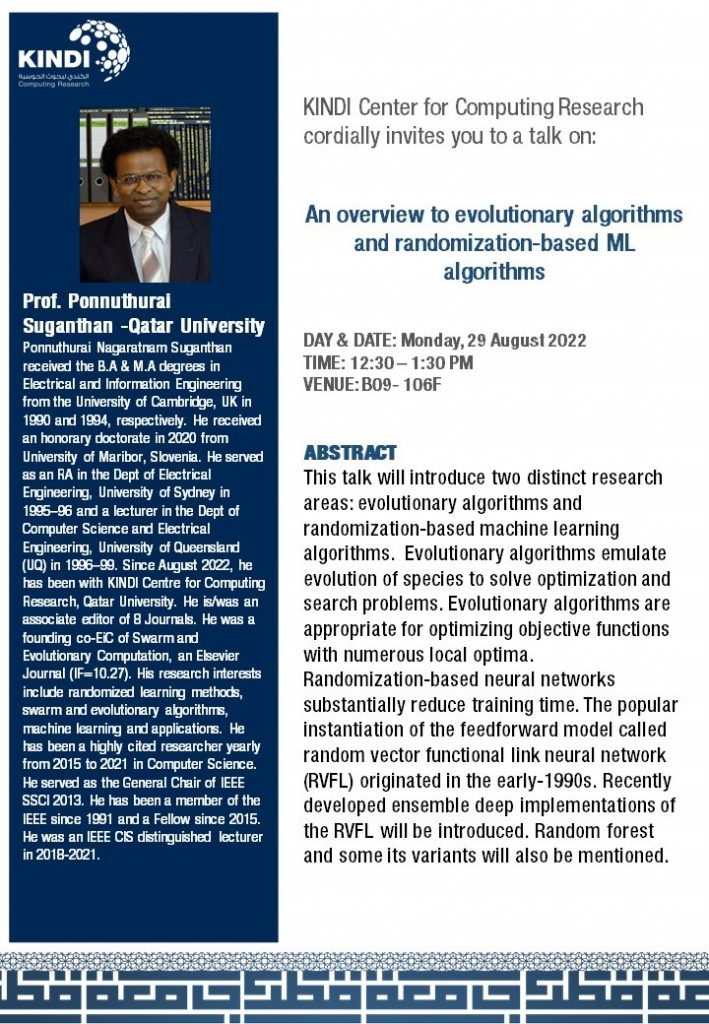
CSE Faculty Receives QU 2021-2022 Outstanding Faculty Service Award
August 15, 2022 / Leave a comment
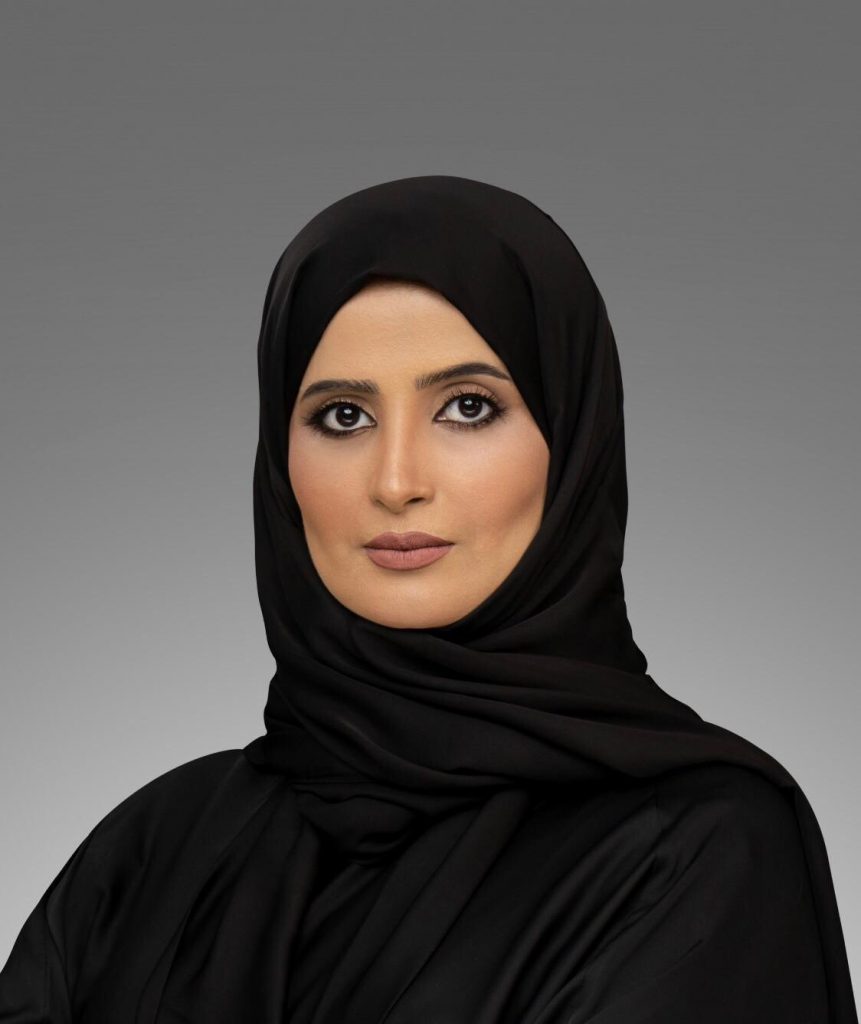
Dr. Noora Fetais
Our faculty member, Dr. Noora Fetais, was awarded the Qatar University Outstanding Faculty Service award for AY 2021-2022. The award is established to honor and recognize faculty members who have demonstrated excellence in service to QU and the community at large.
The faculty service is a cornerstone of faculty duties at QU and represents one of the pillars of QU strategic plan. The type and scope of university services is clearly defined in QU Mission and Key Performance areas, where the university has pledged to address relevant local and regional challenges, advance knowledge, and contribute actively to the needs and aspirations of society. Recognizing the importance of outstanding faculty services and its significance in meeting the University’s mission, the Office of the Vice President for Academic Affairs instituted Qatar University Outstanding Faculty Service Award. Congratulations Dr. Noora for the award!
CSE Faculty Awarded NPRP-C Grant from QNRF
August 15, 2022 / Leave a comment
A major cluster grant titled “The Future of Digital Citizenship in Qatar: A Socio-Technical Approach” from the Qatar National Research Fund (QRNF) was awarded to HBKU, Qatar University, and many other partners to lead a multi-entity, interdisciplinary project on digital citizenship in the Arab region.
The $3.8m four-year grant was awarded under QRNF’s National Priorities Research Program-Cluster (NPRP-C) and enables collaboration between 10 entities from academia and industry.
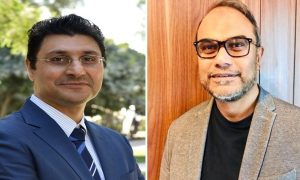
Dr. Raian Ali, Professor in Information and Computing Technology at HBKU, will lead the cluster as program director with six projects that will focus on building an observatory for trends and common topics on social media, web-based tools, educational materials, and research into digital literacy and well-being, gender equity, social inclusion, behavior-based approaches to security and safety, detecting and limiting propaganda and other areas.
Qatar University is leading two projects by Dr. Khaled Khan and Dr. Osama Halabi from the Computer Science and Engineering Department, College of Engineering.
The project led by Dr. Khaled Khan is titled ”Security and Safety as a Behavior”. It is a collaborative project between Qatar University, HBKU, and Bournemouth University. The project will research a behavior-based approach to security and safety. Investigate hacking and social engineering techniques that are successful in the Arab world and propose socio-technical approaches to enhance resilience to manipulators online and encourage reporting. The solutions are based on the approaches of behavior rehearsal, simulation, and social norms.
The project is led by Dr. Osama Halabi is titled “GESI by Design”. It is a collaborative project between Qatar University and HBKU. The project will study how to mitigate issues related to Gender Equality and Social Inclusion (GESI) in social media in Qatar and the Arab world and increase awareness of them. The team will use digital nudging techniques based on annotation and a bespoke set of reactions and emojis and devise tools to facilitate a structured dialogue. The aim is to encourage a more civilized and inclusive language and interaction.
The cluster is supported by a wide range of key stakeholders in Qatar including the Ministry of Communication and Information Technology, Qatar National Library, Msheireb Museums, Qatar Finance Centre, and Fadaat Media, who will provide facilities and enrich the knowledge transfer.
CSE conducted the annual industrial board meeting
May 25, 2022 / Leave a comment
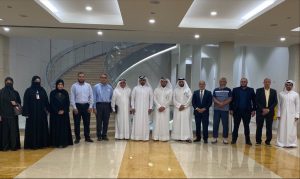
The Computer Science and Engineering conducted the annual industrial advisory board meeting. Stakeholders included entities from Qatar Computing Research Institute, Qatar Mobility Innovations Center, Internal Security Force Lekhwiya, Supreme Committee for Delivery and Legacy, Qatar Fuel Additives Company, Ministry of Commerce & Industry, Qatar Science & Technology Park, Qatar Armed Forces, Joaan Bin Jassim Joint Command and Staff College, Ministry of Transport and Communications, Ministry of Education and Higher Education, Council of Ministers General Secretariat, and Qatar National Bank. This meeting is conducted annually as part of the program improvement cycle process to hear the important feedback of the stakeholders and employers regarding the programs on offer in the department and the quality of our graduates.
The head of department chaired the session and showcased the latest program changes and developments over the past academic year. Some items discussed on the agenda were the recent changes to improve the quality of the graduates and the selection of elective courses in both Computer Engineering and Computer Science programs on offer.
The department is keen to studying and implementing these suggested changes over the next academic year and looks forward to strengthening collaboration with the industrial entities involved.
